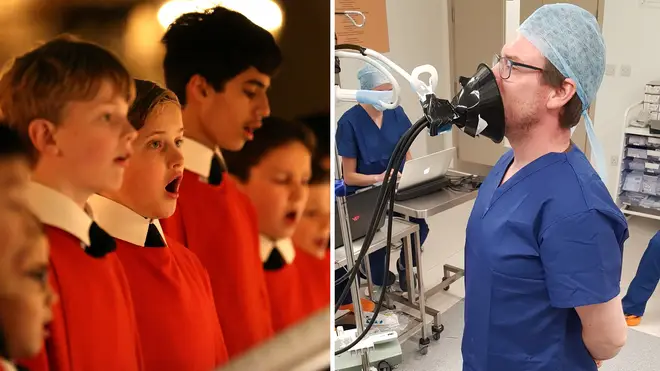On Air Now
Calm Classics with Ritula Shah 10pm - 1am
21 August 2020, 12:22 | Updated: 21 August 2020, 16:36

Scientists have enlisted 25 professional singers to test the safety of voice projection and vocal performances during the pandemic. Here are their findings.
Singing poses no more risk than talking when it comes to spreading coronavirus, a new study has found.
Yet to be peer reviewed, but released by University of Bristol and backed by Public Health England and the government Department of Digital, Culture, Media and Sport (DCMS), the study tested how aerosols are spread during singing.
25 professional singers from a range of disciplines, from opera to jazz, and of different voice types, were asked to breathe, speak, cough and sing a single pitch into funnels, which were used to monitor aerosol transmission.
They were also asked to sing ‘Happy Birthday’ at different volumes, and it was once the volume was lifted that aerosol transmission increased and so risk increased. The loudest singing and speaking – 90-100dB – was found to produce about 36 and 24 times the amount of aerosols respectively as breathing.
The scientists suggest choirs can practise and perform again, but the catch is – they’ve got to keep it down.
Read more: Germany’s leading epidemiologists claim full audiences at classical concerts is safe >

SF Symphony musicians & their little ones play Rossini - Finale from "William Tell" Overture
In its abstract, the study reminds us, “Early in the pandemic, clusters of COVID-19 were considered to have arisen in several choirs around the world. This rapidly led to many governments restricting or suspending singing.
“Concerns that woodwind and brass instruments might also be responsible for virus spread led to similar restrictions on the playing of wind instruments. Consequently, large sections of the cultural sector, along with religious institutions and educational establishments, were unable to rehearse and perform, resulting in profound artistic, cultural, spiritual, emotional and social impacts.”
The study aimed to test if the jeopardy to the UK cultural sector was justified by science.
The scientists behind this study confirm, that “droplets and airway secretions are established vectors” of coronavirus and worked to test, then, the path and reach of droplets and airway secretions during singing.
🎭 ARTS
— Oliver Dowden (@OliverDowden) August 20, 2020
Important step on getting performances back on
Medical study that Govt commissioned & funded shows that singing is no more risky than talking
So we can get performers back on stage without extra social distancing - 3m becomes 1m with mitigations https://t.co/Pku6xbKTKq
Culture secretary Oliver Dowden has welcome the developments, tweeting: “Important step on getting performances back on track. Medical study that Govt commissioned & funded shows that singing is no more risky than talking. So we can get performers back on stage without extra social distancing – 3m becomes 1m with mitigations.”
He followed up with: “The performing arts guidance has now changed and is effective immediately. Good news for music venues, musicians, theatres & opera. We’ll keep working to get the arts going because we are #HereForCulture.”
The scientist co-leading the project, Jonathan Reid, has said, “Our research has provided a rigorous scientific basis for COVID-19 recommendations for arts venues to operate safely, for both the performers and audience, by ensuring that spaces are appropriately ventilated to reduce the risk of airborne transmission.”
Reid told The Guardian, “It is not about the vocalisation – whether it’s singing or speaking – it is about the volume.Just by singing a little bit more softly you really reduce the risk.”
Dowden added: “I know singing is an important passion and pastime for many people, who I’m sure will join me in welcoming the findings of this important study.
“We have worked closely with medical experts throughout this crisis to develop our understanding of COVID-19, and we have now updated our guidance in light of these findings so people can get back to performing together safely.”

Lidl worker surprises shoppers with opera singing
Incorporated Society of Musicians chief exec, Deborah Annetts, has responded to the study, and in an email to Classic FM said: “While we welcome this research, there remains cause for concern that musicians will not be able to fully return to work until performance venues can safely reopen without social distancing.
“The Government must produce clear, evidence-based guidelines to address the challenges highlighted by this study around the volume of vocalisations, the number of participants and the duration of the activity. This is essential to enable more of our members to transition safely back to work and help rebuild the music industry.”
Annetts also referenced the recent open letter industry leaders signed, calling for government support of freelancers and the industry as a whole to ensure there’s not an “exodus of talent” in UK arts.